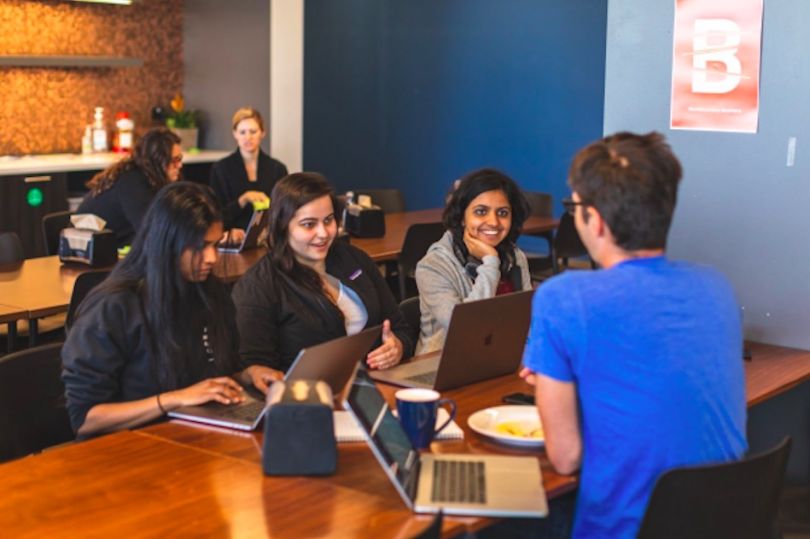Fostering greater diversity, equity and inclusion in the workplace — and outside of it — requires more than making it a company value. It demands real work.
Building more inclusive spaces where individuals can feel accepted as their full selves requires effort from people at every level of a company. Built In SF learned what some local companies are doing to put action behind their pledges of inclusivity.
Among their efforts, some shared how they’re using surveys and data to determine how employees self-identify, then building improved benefits and DEI trainings from the insights. One company created a podcast that highlight the experiences of employees from different backgrounds, while another continued to put effort into executive-sponsored employee resource groups (ERGs) that bring in guest speakers.
Read up on what these San Francisco companies are doing to create more inclusivity in their workplaces and advocate for social justice.
Diverse Tech Companies in San Francisco

Metric Theory Founder and COO Jeff Buenrostro said the marketing technology company has an array of tactics it employs to foster inclusivity in its workplace and advocate for social justice. Employees are even held accountable for their individual roles in creating and curbing systemic injustices.
How does your company approach intersectionality in the workplace?
We host interpersonal dynamics workshops and companywide DEI small group discussions. We also have frequent surveys and feedback solicitation from employees. An upcoming survey will comprehensively measure inclusion and engagement by assessing seven different factors. We will cover demographics that go beyond the typical gender and race metrics to take other aspects of an employee’s identity into account, such as their family status and native language.
Surveys like these effectively establish a baseline so we can get an accurate perception of the current state of our inclusion. We can use analytics to see where employees are having different experiences and shine a light on the areas where we could have the greatest impact and where we need more training.
Employees looked at how they may have been contributing to the problem, and the solution, of social justice.”
What’s been the most impactful action your company has taken to create a more inclusive work environment?
Metric Theory recently partnered with Inside Circle, a nonprofit whose mission is to empower people impacted by the prison system. Through that effort we brought in formerly incarcerated facilitators to work and share their stories with employees in small groups. Employees looked at how they may have been contributing to the problem, and the solution, of social justice. To maintain accountability, each employee created DEI action goals in those groups that are being tracked by the company and reported on in our company all-hands meeting.
These small groups also led to management training conducted by external consultants. The trainings provided our managers with the DEI skills they can use to inclusively support their direct reports.
What role do employees play in supporting your DEI efforts?
Metric Theory has an employee-run and executive-supported DEI group called MT Together, which is broken into subgroups focused on three themes: education, conversation and action. These groups gather DEI information and resources to ensure the MT community has substantial educational opportunities, including an anti-racism educational database. There are initiatives that foster internal and external social justice action, including: enhancing our recruitment efforts, offering unconscious bias training, a media and book club, and an internal podcast where our team can hear the stories and perspectives of their peers.
Through MT Gives, Metric Theory’s nonprofit partnership program, we’re working with organizations and causes our employees are passionate about. Here, the work and dedication of our employees ensure that MT is taking action toward creating a more diverse and inclusive workplace while bettering our communities.

“Many recent belonging and inclusion initiatives were co-sponsored by multiple ERGs in an effort to highlight and promote intersectionality,” Dominique Baillet, Coinbase’s senior director of people strategy and special projects, said.
The leader at the cryptocurrency wallet platform discussed the big impact employees — and the ERGs they belong to — have on the company’s overall DEI strategies.
How does your company approach intersectionality in the workplace?
Early in the year, the employee resource group leads decided the theme of 2020 would be “Allyship & Intersectionality.” Many recent belonging and inclusion initiatives were co-sponsored by multiple ERGs in an effort to highlight and promote intersectionality. We kicked off a program where each ERG selected an organization for Coinbase to match employee donations to.
Women Empowerment (WE@) and ColorBlock (Black and brown employees) both selected Black Girls Code; Thrive@ (celebrating neurodiversity and mental health) chose The Hidden Genius Project; APAC@ (Asian and Pacific Islander employees) chose Give2Asia; and Project and Pride@ (LGBTQ+) chose the Transgender Law Center. Senior leadership chose GiveCrypto, which donates cryptocurrency to people in poverty to help them jumpstart their way to economic empowerment and freedom.
Each ERG selected an organization for Coinbase to match employee donations to.”
What’s been the most impactful action your company has taken to create a more inclusive work environment?
The top thing on our mind right now is Coinbase’s decision to become a remote-first company, which is a major shift for employees. While this decision was certainly nudged along by COVID-19, we are embracing remote-first as the future of work and what it means to create an inclusive and equitable work environment. It creates the ability to tap into broader and more diverse labor markets. Remote work also allows for greater flexibility for working parents and employees who need physical or mental health accommodations.
Beyond that, we’re optimistic about rethinking how we create a better work experience than what we had pre-COVID. For example, one topic of discussion is how to ensure performance management systems better align with tangible employee impact. Another is how to reduce reliance on subjective factors like face-to-face time that are often rife with unconscious bias.
What role do employees play in supporting your DEI efforts?
Many of our ERGs were started by employees, and they’ve played a huge role in proactively creating the inclusive, warm spaces they want to foster. We have a lot of engagement in our ERGs from our customer operations organization. This org typically has a higher percentage of hourly employees and contractors who may not feel the same level of safety in voicing their concerns the way salaried employees might. ERGs give them an avenue beyond their direct line of managers to voice concerns in a setting that feels safe and advocates for them.
We also invest heavily in manager development to coach leaders in fostering an inclusive environment where all voices — despite differences in professional background and tenures — are considered.

The diversity, inclusion and belonging (DIB) team at talent aggregator Upwork plays a vital role in the company’s DEI efforts. HR Specialist Kristine Vu said the group pushes for greater inclusion through initiatives like bringing in guest speakers and building improved benefits based on how employees self-identify.
How does your company approach intersectionality in the workplace?
In celebration of Pride Month, our DIB team partnered with Up&Out, our LGBTQIA+ employee resource group, to host a webinar featuring Kenji Yoshino. We discussed Kenji’s research on “covering” and his experiences as a gay Asian American man. There should never be a minute when an Upwork employee can’t be their full self, which we support by encouraging diversity of thought and experience and ensuring everyone is heard. This idea helps us live our mission of creating economic opportunities to give people better lives.
Data will enable our DIB team to build support, education and benefits that serve our entire company.”
What’s been the most impactful action your company has taken to create a more inclusive work environment?
In addition to all the education sessions our DIB team and ERGs host, our push for inclusion comes from our CEO and leadership team as well. Each ERG has leaders and executive sponsors within the company and welcomes participation from all our offices and remote employees. Employees seeing company leaders proverbially “walk the walk” alongside us attests to our company’s investment toward a more inclusive and equitable work environment.
Recently, our company announced our “Be Seen” self-ID campaign. Upwork asked all employees to share their sexual orientation, gender identity, racial identity and caregiver status in our HR system. This data will enable our DIB team to build support, education and benefits that serve our entire company. It will also help other teams such as talent acquisition identify where we lack in diversity and take action to address it.
What role do employees play in supporting your DEI efforts?
Our Head of DIB Erin L. Thomas says, “Ally is a verb!” All employees are instrumental in supporting DEI efforts not just at work, but outside the office as well. In our daily lives, we have a huge role to play to be allies to our communities, whether it be educating children, having tough conversations with family members or just showing up for marginalized communities.
For example, to support the Black Lives Matter movement, we encouraged all Upwork employees to self-reflect and self-educate on what it means to be an ally and how we can lend support as individuals.

Katy Fitzgerald said Tapjoy’s employees are more than the recipients of the adtech company’s DEI efforts. The DEI committee lead said employees are also the company’s greatest contributors in what intersectionality efforts look like at the company.
How does your company approach intersectionality in the workplace?
Tapjoy’s DEI program is built upon a commitment to ongoing expansion and growth, prioritizing initiatives that embrace and support the intersectional identities of our diverse Tapjoy community. We take the necessary steps to listen and better understand the unique experiences of marginalized groups. We strive to correct unconscious biases and improve cultural competency across our organization.
We take the necessary steps to listen and better understand the unique experiences of marginalized groups.”
What’s been the most impactful action your company has taken to create a more inclusive work environment?
Our most impactful act was the support and sponsorship of our employee-led movement that led to the creation of Tapjoy’s DEI committee. Our DEI committee is supported by HR and composed of a growing team of over 25 employee volunteers and four executive sponsors. This team is leading initiatives that incorporate DEI into the following company pillars: how we engage and celebrate our employees and multiculturalism; opportunities for professional development; business practices; policies and strategies; community impact within the ad tech; and mobile industries.
Fundamental functions of the committee include amplification and allyship. Our initiatives and communication channels empower employees at all levels to utilize their unique experiences and intersectional perspectives to lead and contribute to DEI decision-making here.








